Ralph Rowlands
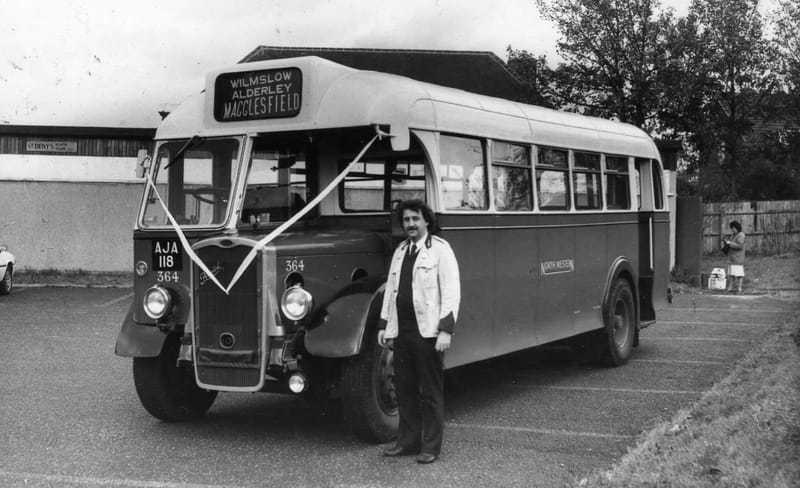
Ralph Rowlands - Memories of the ‘Crosville Family’
In 1973 I took a position as Senior Accounts Clerk in the Head Office of Crosville Motor Services at Crane Wharf, Chester. I had been interviewed for the job by Assistant Company Secretary Mike Moors and Financial Controller Ron Chesworth. While being escorted for interview to Mr Moors’ office by receptionist Jackie, she explained that the building had previously been a warehouse, later a machine shop and now adapted as offices.
When I arrived at Reception on my first Monday morning at 0835 hrs, the designated start time, I found the door locked, so waited. A passing gentleman who turned out to be Wages Clerk Alf Armstrong, aka Pappa Luigi, asked me if I was a new starter and advised that Reception didn’t open until 9am. He then led me into the building by the back entrance, where Company cars were parked.
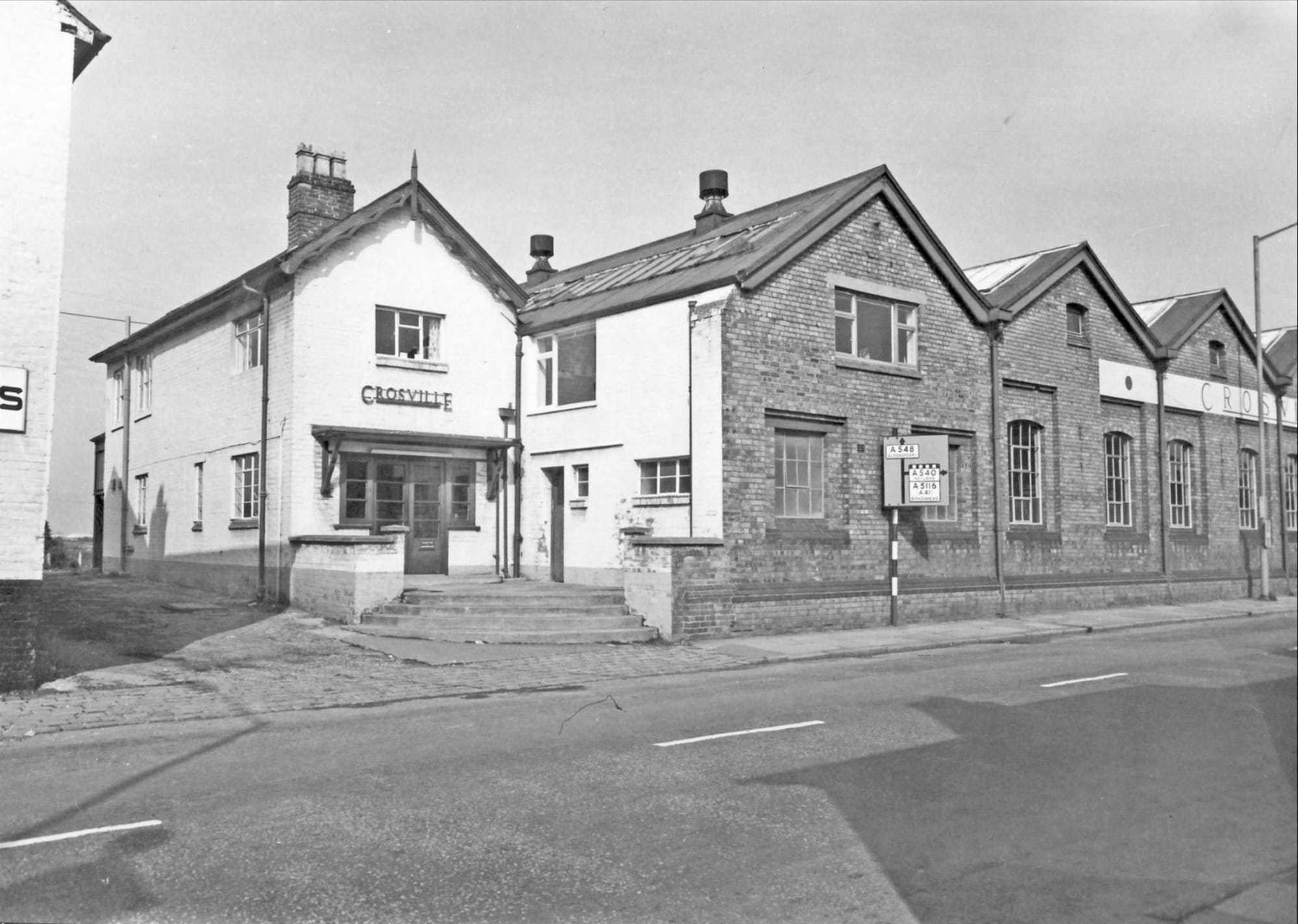 Photo Reception at Crane Wharf, Chester where I waited for admittance before being rescued by Alf Armstrong and shown the “Worker’s Entrance” at the other end of the building.
Photo Reception at Crane Wharf, Chester where I waited for admittance before being rescued by Alf Armstrong and shown the “Worker’s Entrance” at the other end of the building.
If 0835 seemed a strange start time, then what about 1655 as a finish time? I soon discovered that this was designed to accommodate office staff from along the North Wales coast who could travel by Cymru Coastliner L1 service. This was due to arrive in Delamere Street Bus Station at 0828, another leaving there at 1700 for a return journey, the Sealand Road stop being just a 2 minute walk away. How carefully planned this had been. For those of us needing to shop, the C50 Sealand Road to City service picked up outside the Crane Wharf gates a couple of minutes after the start of our lunch break and returned in good time for the afternoon. Add to this the free travel pass, we were well looked after.
I was introduced to George Turner, Senior Accounts Assistant, who was my immediate boss, and welcomed. I was shown to my desk and chair and gradually introduced to the other members of staff – Mick Plant, Chief Cashier; Les Morris, Senior Wages Assistant; John Bilton, Senior Wages Clerk; Bob Harris and Ken Chidlow in the Traffic Department and so many more. I rapidly became friendly with David Williams in Traffic as he and I were, at that time, both Scout Leaders but felt acutely jealous of another Accounts Clerk, Paul Stephens. He travelled in from Warrington where he was able to work weekends as a part time conductor. Not long afterwards though, Paul left Crane Wharf to take up a full-time conductor’s post at Warrington where Sid Swift was Depot Superintendent.
I soon settled into the office routine, helped greatly by Edith Sinclair and Jean Wragg while the office juniors, Kathy Cooper, Janet Prydderch and Peter Butters showed me the more mundane tasks like helping in the Post Room. One morning while distributing the post along the back corridor where the senior officers were located, I greeted a gentleman with a cheery “Morning Cocker” when Kathy advised me that he was P H Wyke-Smith, the General Manager. No wonder I received a peculiar look! Fred the van driver brought various snippets of information in from the outside world whilst Mair Reamsbottom in Accounts also kept us informed. Her husband Stanley was a driver at Chester Depot, which was also known as The Rink (a former roller skating rink). Mair had been Clerk in Charge at Llanidloes before it closed whereupon she and Stanley moved to Chester. Charles Williams was an invaluable source of information about vehicles and Depot allocations and anything he didn’t know could be found through his boss, Bill Cunliffe. What Bill didn’t know about Crosville’s buses was not worth knowing.
Part of my duties was to maintain manual accounting ledgers, up to trial balance stage, alongside the computerised accounting system which was being introduced. Records to manual ledgers were made simpler by using the Posting Summary which Company Accountant W J (Bill) George had introduced. He was also the unofficial Company photographer and sometimes rather unfairly referred to as “Snapshot”. This made my life easier but I was always glad of the help of comptometer operator Winifred Parry who would rapidly calculate these figures for me on her machine. These were the days before electronic calculators. Winnie worked in the typing pool where Miss Dorothy Roberts kept the dozen or so typists hard at it.
Another part of my duties was to pay rent and rates on Company properties. One year I missed the deadline date for Chester rate payments and the Company featured on the front page of the Chester Chronicle as “Debtors”. I didn’t live that down for a very long time. Wayleave payments for Bus Stop poles or shelters on other people’s land was another of my tasks and I was surprised how many of these there were. I also had charge of the deeds and other legal documents all held securely in the fireproof strongroom, filing and retrieving them for senior Company officers.
Working in Head Office gave me the opportunity to meet all sorts of people. Dic Jones (Dic Magic), Buildings Superintendent, was often about the building, indeed his office suite was upstairs in Crane House, attached to Crane Wharf. Divisional Managers were often around and Divisional Office Cheshire North West was also in the building, with Fred Leese as DM when I started there, later replaced by Harold Foulkes. Company trainees and NBC trainees assigned to the Company were placed here to gain understanding of what was done at HQ and I often envied them their wide-ranging experiences. Alan Stubbs of Publicity Department who was being taught to drive (in a bus!) started me on the road to obtaining my PSV Driving licence with Stan Sterlini, Schedules Officer, and Denis Helsby, District Traffic Superintendent Chester helping me along the way.
In 1974, it was arranged that I would receive PSV driver training on Saturday mornings by Chester Driving Instructor Les Dutton. My first lesson was in a Royal Blue Bristol LS coach on loan to cover vehicle shortages. After sufficient lessons in Lodekkas DLG 800 and DLB 900 I was put forward for my test, conducted by delegated examiner Inspector Fred Astbury which, I am pleased to say, I passed at the first attempt. Having completed my practical driving, I was moved on to my Highway Code understanding and shown flash cards to recognise various road signs. The one I struggled with was a plain grey background with a pattern of yellow lines on it, recognition suddenly dawning that it was an overhead view of a box junction. Not being able to catch me out on any Highway Code questions, Fred brought me down to earth by asking what the camber lean angle of a double decker bus was, which I confessed to not knowing. He told me it is one inch for every four degrees of camber, pointing out this was useful to know how far out from the kerb the bus needed to be on a steep camber to avoid the upper deck colliding with a lamp standard or telegraph post!
The following Saturday morning I was to report to Chester Depot for types training with Les Dutton and taken out in a Bristol RE and a Leyland National, two very different vehicles. I was then allocated a two door Johnsonbox (Farebox) equipped RE to operate the C40 City to Chester Zoo service with Gordon Moore as a conductor, to ensure I followed the correct route and to give change to any passengers who needed it. The Johnsonbox was a clear sided construction on the cab side into which passengers dropped their fares. Having checked the money was correct, the driver used a lever to drop the cash into a security box which was hidden from view. On return to the depot, I asked the Garage Foreman Jimmy Smith how to empty the box, his reply was “That’s what all the drivers want to know!” but I only wanted to pay my takings in. I also learned on that trip that the tight “U” turn at the Chester Cross end of the Town Hall Square deserved respect when I was forced into a humiliating shunt to complete the turn to achieve the Odeon departure stand.
Now armed with my PSV Driver’s badge, CC107090, I observed the lost mileages at local depots and found Mold to be suffering on Saturdays due to driver shortages. I contacted Cliff Bucknall, D S Mold to offer my services and following discussions between himself and Mold T&G Union reps Keith Ellis and Arnold Hewitt, I worked my first day shift at Mold. I drove DFB 171, which remained my favourite bus there. Thereafter I was only allowed to work late shifts but I was happy doing that. One of the fitters at Mold, Eric Mangham, with his driver’s badge was then willing to drive some Saturday late duties. To cover a conductor shortage at Mold, I obtained my Conductor’s badge, CC140837, and conducted for Eric after I had been Setright trained by Tommy Evans at Chester. Occasionally a one-man shift needed covering on a Saturday night and I filled in for that too. As driver, conductor or one-man driver, I enjoyed my time at Mold and made some good friends there. One Saturday afternoon, I had parked my car at the back of the depot and as I ran in to begin my shift, I was stopped by Arnold Hewitt and told the only time to run was on the way home but he left me with a cheery chuckle and good humour. On another occasion, Keith Ellis asked me if I was being paid the correct rate for the work I was undertaking at Mold and I assured him I received conductor rate when conducting and the driving rate for the driving duty undertaken. He was concerned that I was being paid my office rate of pay whilst on the road but I assured him I would not work for less than the agreed NJC and NCOI rates, having to produce my payslip to him to show that even as Senior Accounts Clerk, my pay was less than that of a conductor which surprised him.
In a strange way, I was the first service driver for some conductors when they worked their Saturday rest day after passing out on completion of their training, Barry Redfern, Ray Simmonds, Colin Scott, Gary Fortune and Glyn Rowlands, for example. I then worked as first conductor for Barry, Ray, Gary and Glyn on their first shift behind the wheel after they had qualified as drivers. What I quickly learned to be careful of was if I had been out with a Bristol LD which had vacuum brakes, switching to a FS or FLF with air brakes needed careful re-adjustment of brake pedal pressure. The first jab on the brakes sometimes had the conductor tumbling down the aisle which did not make for good working relations. Among others who stood out to me were conductresses Irene Jones and Bet Green. Bet told me that she had been evacuated from Liverpool to Mold during WWII and had never gone back. The canteen upstairs often was the locations of lively debates, often loud, sometimes abusive, but it never ceased to amaze me that if one of the conductresses walked in, without anyone commenting, the language was muted instantly. Anyone who worked at Mold could not forget C F (Colin) Williams with his cheery voice calling out over and over the route of his service as his bus approached the stand which earned him the nickname of The Myna Bird. I met him some 40 or so years later on Mold market and he was still as cheerful as ever. Conductor Franko, who had an Italian restaurant in Buckley, was always looking for a lift home after a late shift but would then take you into the restaurant and give you a pint (or two) as a thank you. I looked forward in the office to a Friday afternoon phone call from Garage Foremen Jack Hawkes or John Reed and their relief, Rheinallt Thomas, appointed after Duty Foreman Neville Howells had died. Sadly, Mold depot is no more, now the site of a retail outlet, but memories are still there.
When Mold was fully staffed and not losing mileage due to driver shortages, I looked elsewhere and on one occasion spent a Saturday evening in Liverpool. I booked on at Edge Lane depot as a conductor because I didn’t know the Liverpool routes and rode a shunt bus to Pier Head. I did my first journey conducting a Bristol VR but, when we returned to Pier Head, the eagle-eyed inspector there spotted my red driver’s badge. He put me in a Bristol RE and paired me with a conductor to show me the way and we operated a Warrington round trip followed by a late journey with me at the wheel of another VR. This was an eye-opening experience which I never repeated.
I was lucky to be able to visit the Uniform Stores in Crane Wharf, overseen by Frank Moore, first to get myself issued with a uniform summer tunic and later an almost full NBC uniform for my driving/conducting ventures.
Back to my day job at Crane Wharf, another weekly task for me involved making up wage packets for Head Office and Sealand Road Works staff. Thursdays usually began by me accompanying Mick Plant to the bank to collect wages cash, usually in a Company Mini or Marina driven by Stan Sterlini or Bob Harris. Mick and I then took the cash to a dedicated room upstairs where a girl called Joan from Accounts and Ken Jones from the Traffic Department joined us to count and insert cash into ready prepared wages envelopes. There was a rule that there had to be a certain minimum amount of change in every packet, the resultant total in each denomination having been previously calculated for us by Winifred. When all envelopes were filled and the cash all used up, envelopes were sealed but if there was a note or coin short or left over, all the envelopes had to be re-checked. We then handed the Sealand Road Works packets to Catering Superintendent Ted Harding for him to distribute at the works while Mick distributed Head Office ones.
Ted Harding was a stalwart of the Works Canteen at Sealand Road, popular with everyone. When he approached retirement, all the canteen staff decided they would finish too, rather than work for a new boss. Kath Kendrick became the new Catering Manageress and my own wife Tina was cook, with five or six other girls completing the team. Their first morning open was I believe hectic to say the least but they all worked together and made a tremendous success of maintaining and developing further the Sealand Road Works Canteen, Tina’s warm scones for morning tea break apparently being legendary.
I had been courting Tina all the time I was employed in Head Office and working overtime on the road to help us put the deposit down on our newly built house in Flint, for which we had a mortgage to meet the £6395 price. In September 1975, we were married in St Ethelwold’s Church in Shotton and moved into our new home together after a short honeymoon in Llangollen.
I had for some time been itching to become more involved in the operational side of the Company so when Joe Jones retired as Depot Superintendent (DS) Flint, I applied for the job. When being interviewed by Traffic Manager (TM) Algie Elwin and his assistant (ATM) Fred Leese, Mr Elwin asked me why I had bought a house in Flint, suspecting I guess it tied in with this application. I told him candidly that it was about the only one I could afford. National Bus Company (NBC) Trainee Trevor Roberts, who I got on very well with, actually got the job on that occasion. He had a family history with Crosville as his grandfather Captain Roberts had been Traffic Manager at one time.
The next, and probably more suitable, job I saw advertised was for Assistant to the District Traffic Superintendent (DTS) at Runcorn so in went my application. On the day of the interview, Divisional Manager (DM) Harold Foulkes, referring to my application letter, told me he was concerned about my age as I had put my date of birth as the current year and not 1951, meaning that I yet to be born. This broke the ice and relaxed me, meaning I could convince him I was the man for the job which I succeeded in securing. Now it meant travelling from Flint to Runcorn every day, but via Chester to drop Tina off for her job in the Central Works canteen.
Runcorn had a new depot on Beechwood Avenue and of course, right next to the Busway, replacing the old Broadway depot. Having become a “New Town”, it had fast sweeping expressways, reminiscent of what I imagined America to be like, but also railway lines and even canals. The first time I went to find the depot, I could see it from several locations but not get to it, with a canal or railway line being in my way. When I eventually arrived there, I found a new, modern set-up. Receptionist Janet led me through to meet DTS John Valente. Then into the cash office with Chief Clerk Betty Jeavons and the cash office staff, Richard, Gladys, Lil and another Gladys. I was shown the small, windowless, space with my desk and chair in what was my office. Then on to meet the rest of the team, Duty Foreman George Weach and Garage Foremen Ernie Dutton, who subsequently went off to be a steward at a social club and was replaced by Geoff “Bungie” Morris, Ernie Lee and “Jock” Murdoch McKenzie Gerrard. They were all different in their own way but working well together it seemed. Billy Brookes and Terry Nestor were T&G Union reps when I was there. They introduced me to the concept of route timing exercises. I learned a lot from these two guys and from John Valente.
I was taken on various site meetings in connection with joint services when I met, amongst others, David Cunningham, who was at that time running Halton Transport, David having formerly been a Crosville Trainee. Gordon Hanks was garage hand who showed me how to check levels in fuel and lubricating oil tanks which were under cover and how to accept deliveries from the road fuel tankers. Once, when we had taken on too much express duplication work, I had to cover the night shift of garage driver. This included taking late finishing drivers home on the staff bus route and thereby releasing the allocated man (Tommy Howarth) for express work the next day. There were some very surprised faces the next morning when I turned up driving the staff bus for early starters. Tommy was also Driving Instructor and at my request, took me out on type training, in the “Battery Bus”, the Leyland National converted by Ribble to electric traction. The batteries required were so bulky and heavy they needed to be placed in a trailer towed behind the bus. They also needed to be charged for 18 hours to produce roughly 3 hours service work and the bus was often seen crawling back into the depot very low on power. Because of its trailer, Traffic Commissioners at that time would not allow it into service on conventional roads and it was therefore confined to busway work. Today’s headlong surge into electric powered vehicles may have come a long way since then but I am dubious after that early failed experiment. Time will tell!!
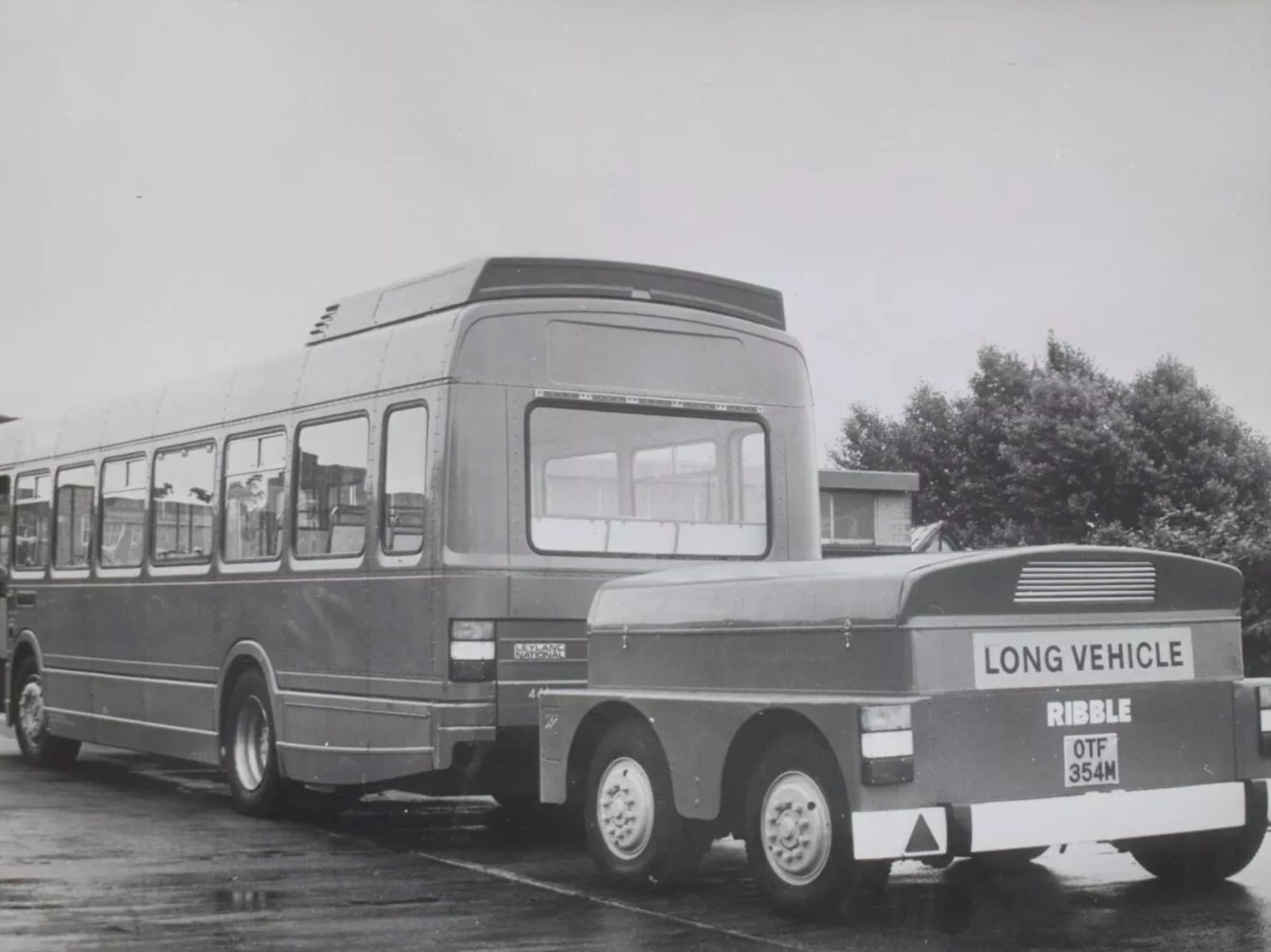 Photo: Ribble 10.3-metre Leyland National registered OTF 354M fleet number 461, converted to battery power, mid 1970’s.
Photo: Ribble 10.3-metre Leyland National registered OTF 354M fleet number 461, converted to battery power, mid 1970’s.
Although I was only at Runcorn for just over thirteen months, it was a very steep learning curve, especially with the busway - “the vision of the future” – which people told me would look good on my CV. In dealings with the trades union, I sometimes thought they were trying to take advantage of my inexperience but John Valente kept a very tight rein on everyone.
Derek Bean, then D S Ellesmere Port, NBC Trainee Maxwell Jones and I were enrolled on an NBC Training course in Portsmouth Poly - The Recruitment, Selection and Retention of Staff. We travelled by train to Portsmouth for a three night stay where we were joined by Martin Robinson, DTS Macclesfield and delegates from other NBC companies. The course itself was instructional and educational but the evening discussions between attendees over a couple of pints brought out more stories, tales and experiences which also helped me in my future career. Max went on to become Divisional Manager Gwynedd after my spell in Pwllheli before he moved on to Northern General.
Having been successful in my application to become Depot Superintended Pwllheli, I set off from The Raven bus stop in Flint on an early Monday morning Cymru Coastliner for the three hour journey to Caernarfon. There I entered the Divisional Office above the Enquiry Office on Castle Square to be greeted by Assistant Divisional Manager O P Owen. This was a whole new, predominantly Welsh speaking world but I was pleased that I could understand at least some of the telephone conversation O P was undertaking with Pwllheli depot – “Mae gen I eich boss newydd yma” (I have your new boss here)! O P then took me by car to Pwllheli to introduce me to the depot staff, Robert John Thomas, Chief Clerk, Depot Clerk Sulwen Jones, Enquiry Clerk John Thom (J T Jones) and William Hughes Mechanic, along with T & G Union reps Robin Parker and W J Jones (Will Bach Mynytho). Then on to meet the rest of the staff over the next few days, including those in the outstations under Pwllheli, Porthmadog (with 6 vehicles and their own office and staff), Nefyn (2 vehicles and drivers) and Aberdaron (1 high capacity s/d with 2 drivers).
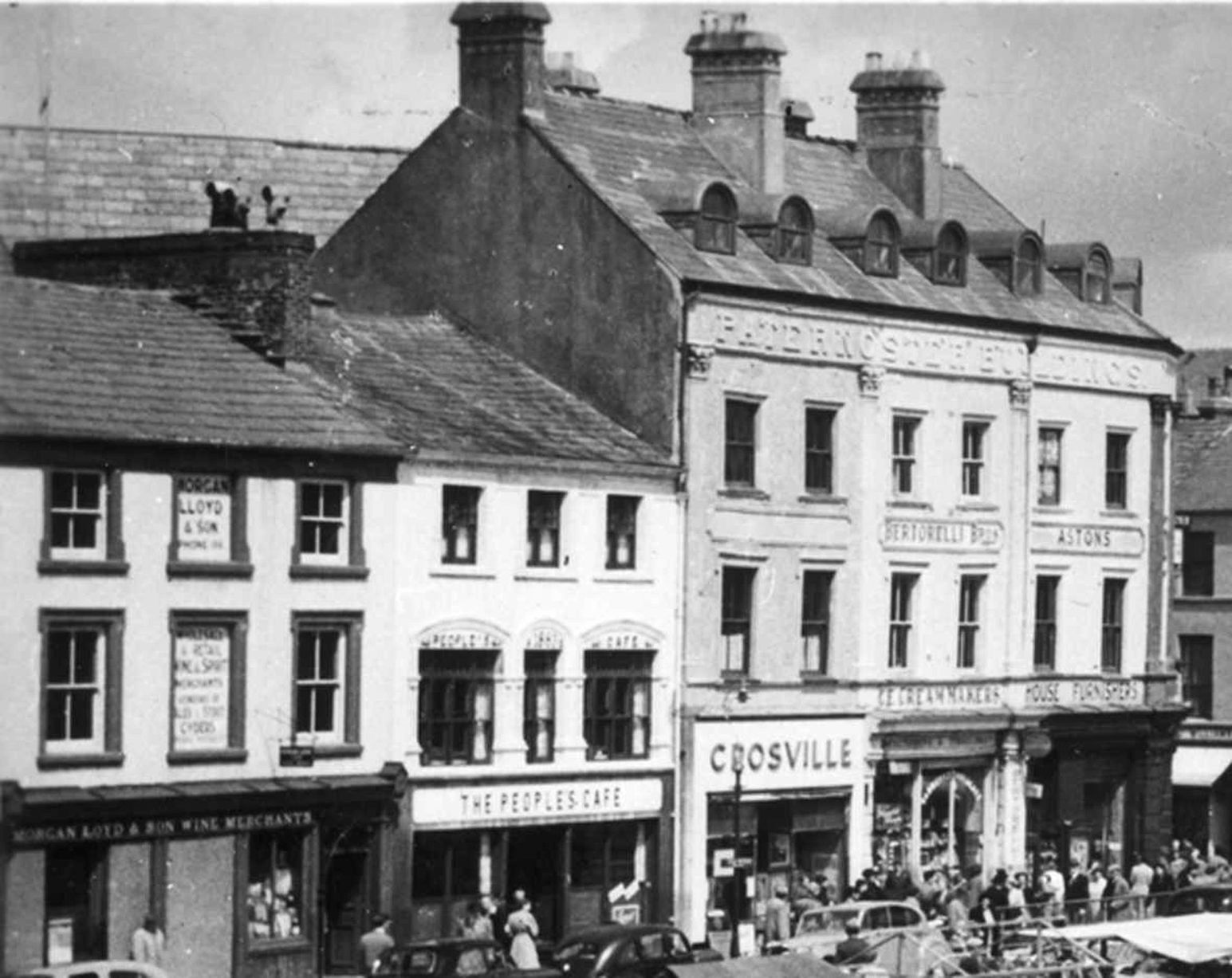 Photo: Crosville’s office at Caernarfon ‘Y Maes’ (Castle Square).
Photo: Crosville’s office at Caernarfon ‘Y Maes’ (Castle Square).
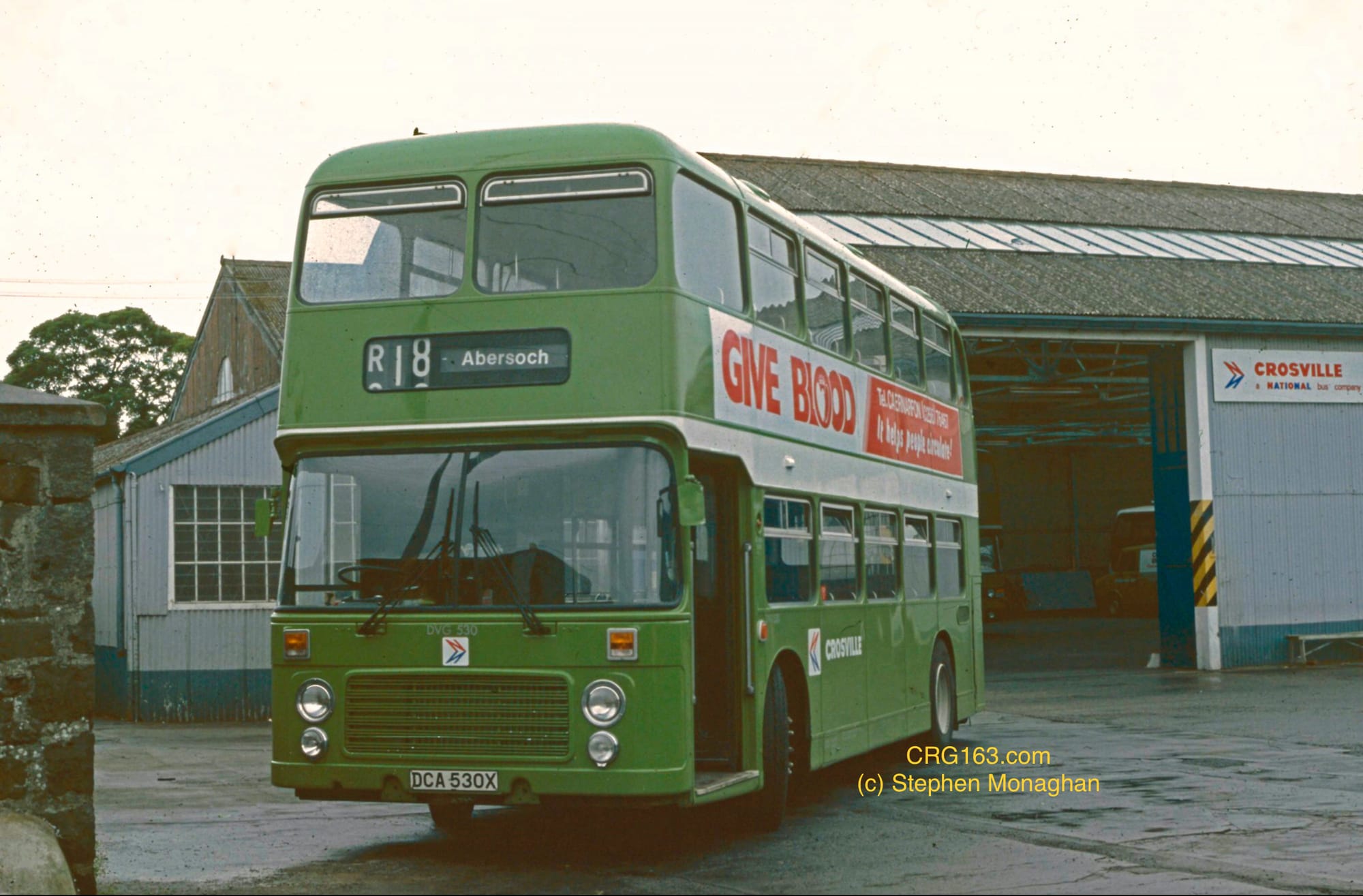 Photo: DVG530 parked on the forecourt of Crosville’s depot in Pwllheli. The site is now occupied by a B&M store. Photo reproduced with kind permission of Stephen Monaghan.
Photo: DVG530 parked on the forecourt of Crosville’s depot in Pwllheli. The site is now occupied by a B&M store. Photo reproduced with kind permission of Stephen Monaghan.
Clynnog and Trefor (C & T) were often hired in during the summer months to cover extra excursions from Butlins Camp, Bob Parker doing an excellent job of selling seats there.
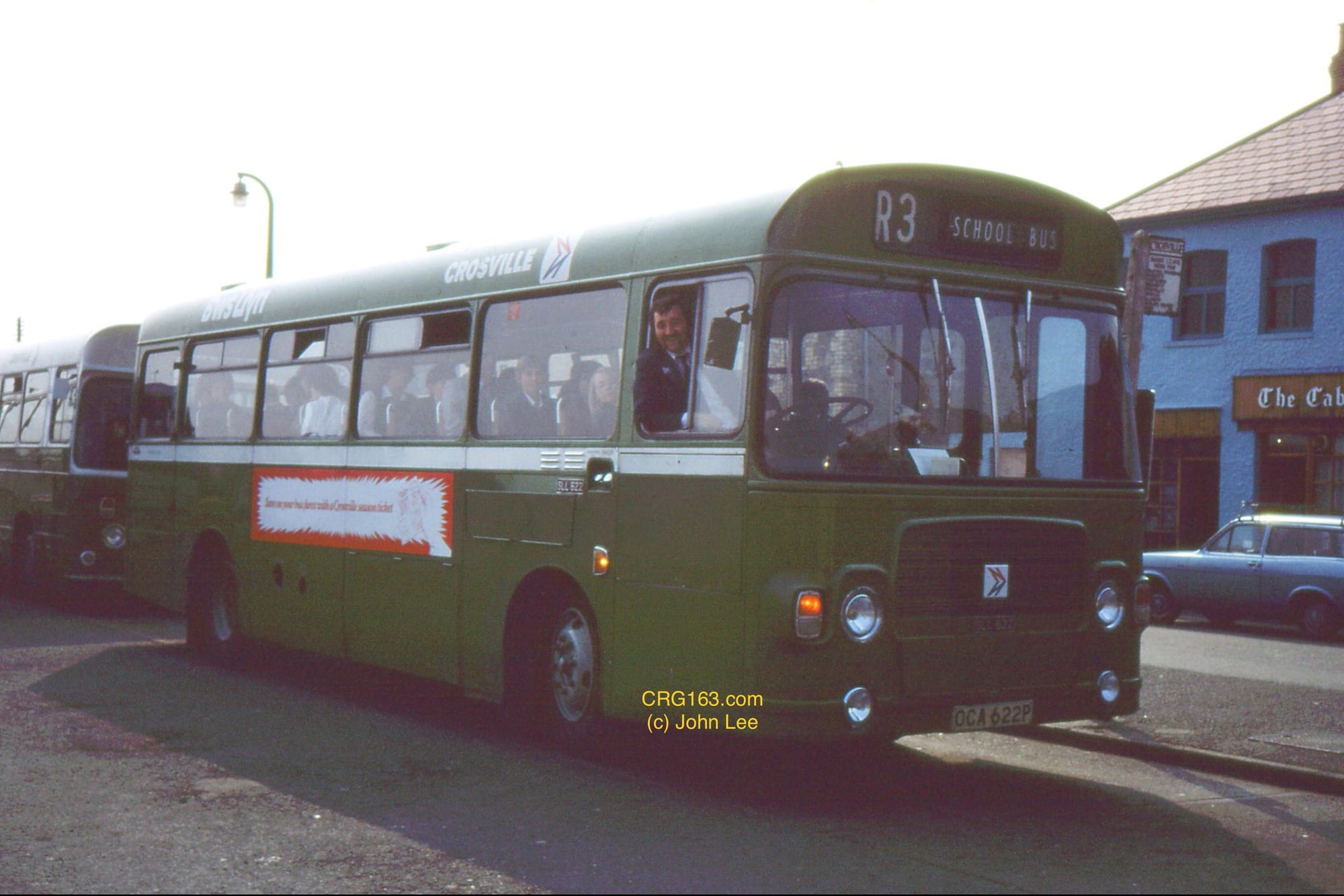 Photo: On a busy Wednesday afternoon, with many drivers occupied on Excursions from Butlins Camp, it was sometimes necessary for me to pitch in and drive a school duplicate service as here with Bristol LH SLL622 on the stand at Pwllheli Maes. Photo J R Lee.
Photo: On a busy Wednesday afternoon, with many drivers occupied on Excursions from Butlins Camp, it was sometimes necessary for me to pitch in and drive a school duplicate service as here with Bristol LH SLL622 on the stand at Pwllheli Maes. Photo J R Lee.
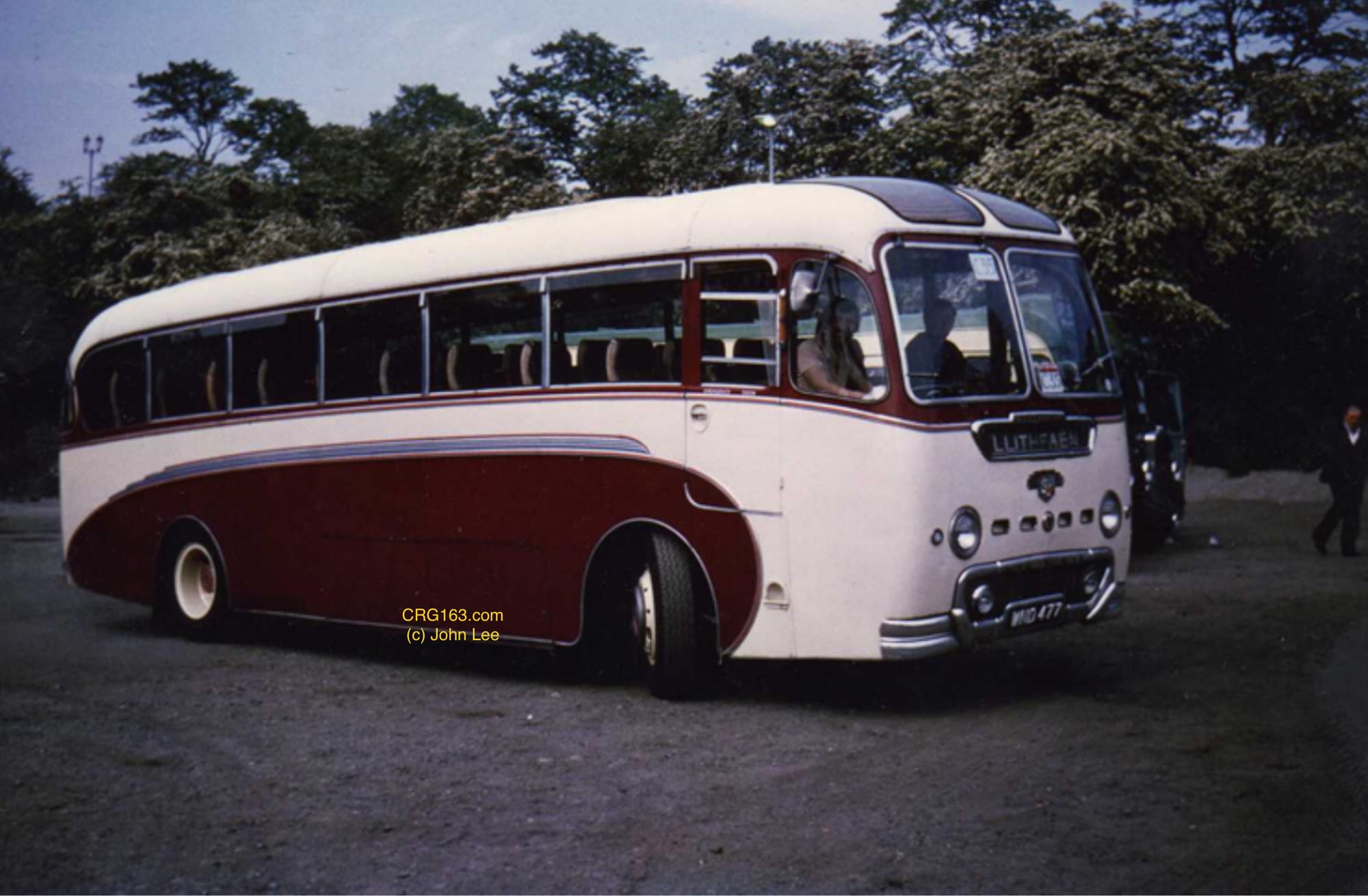 Photo WND477 at Chester Roodee before setting off for Manchester. Photo J R Lee.
Photo WND477 at Chester Roodee before setting off for Manchester. Photo J R Lee.
The conveyance of parcels on buses had always contributed to revenue raised by Crosville and other operators. This practice seemed to be in decline in many parts of Crosville territory but in deepest Wales, it was still alive and well. There were plenty of Parcels Agents for me to visit to cash up for the year ends, many of them in small shops, some even acting as excursion ticket agents too. I visited Mr Morgan in his newsagents/confectionery shop in Criccieth, just across the road from the former Crosville Enquiry Kiosk and depot building. He came out from the back of the shop carrying a large box which displayed a new type of chocolate bar on its side and asked if I liked these. I confessed to not having tried one, he laughed and showed me that the box contained his parcel and excursion ticket returns. Cruel!!
Tina and I had by now bought a cottage on the Caernarfon Road and were comfortably settled in. Robert John’s funeral was approaching and with my lack of knowledge of local customs, let alone language, I sought guidance from my newly appointed Divisional Manager, Geraint Humphreys. His advice was simple and sound – follow Will Bach Mechanic’s lead. Will had many years knowledge and experience of both the Company and the community and was always happy to help me.
Butlins Holiday Camp just outside the town played an important part in the town’s life and economy. It was open only during the summer months but provided seasonal employment to many including the bus industry for summer services and excursions. I could tell walking to work in a morning, if I met more than two other people on the streets, Butlins was open. There was also a change in the town; in the bank, for instance, in summer, an available teller would call “Who’s next” and if no one moved “Pwy sy’n nesa” whilst in winter it would be the other way round.
Will Bach Mynytho came to my office one Friday morning to tell me Wales had a big rugby match he wanted to watch on TV the following afternoon. He was on the 1545hrs duty starting with the 1600 R10 to Uwchmynydd but nobody would swop with him, and asked if I could do anything for him. I told him that if no one would swop for the Union Secretary I didn’t think I would have any success getting a swop for him. He looked at my uniform jacket hanging on the back of my office door and grinned, saying “I just wondered…..”. Understanding what he was asking, I told him to check with all his members if they objected to me covering his first part duty for him. He went out and was back within two hours saying no one objected as long as I would have done the same for any of them! I operated his journey the following afternoon with a short “B” series Leyland National allocated for the duty which required fuelling on return to Pwllheli ready for the rest of the duty. I was on the pump putting diesel in when Will appeared alongside me, surreptitiously slipping a fiver into my shirt pocket, which I told him I didn’t want. He said “Take it Rowlands, if we had won it would have been a tenner!”.
Market Analysis Project (MAP) had by now been and studied Pwllheli area services, reintroducing double deckers to the area for the first time in many years. As will be imagined, much tree lopping was going to be needed to open up headroom for ‘deckers to operate once more and an open top Bristol LD was stationed at Pwllheli for the job. Once lopping was completed, second hand ‘deckers were shipped in, Fleetlines from Southdown and VR’s from South Yorkshire and elsewhere I believe, and put into service. Not all Pwllheli drivers at this time had DD licences so retraining had to be undertaken and tests taken. Bristol MW’s were being phased out and largely replaced by “B” series Leyland Nationals alongside Bristol LH’s, the depot allocation changing completely. Before the open top LD was returned for promenade work, I had threatened young Wynn Peate that I was going to roster it onto the Butlins market day service for him to work, he complaining he might lose £5 notes from the top deck!! I never did of course but I did take the two young sons of Alan Heywood, then Traffic Manager at Ffestiniog Railway, along Pwllheli promenade just for the experience for them, and the pleasure for me.
When Ffestiniog Railway completed the reopening of their line from Porthmadog to Blaenau Ffestiniog, Alan had included me on the list of invitees to travel on the first “down” train, a surprise for David Meredith, Crosville’s General Manager at the time, as he too took his seat on that train. Alan and I had worked together putting special trains on to meet coaches from Butlins when they started up School Adventure weeks before the main season. I was very proud of the letter I received from Traffic Manager Algie Elwin congratulating me and thanking me for my “spontaneous response to the challenge” which O P Owens, by now my Divisional Manager, had informed him of.
The Snowdon Sherpa was introduced during my time at Pwllheli to try to ease parking problems in Snowdonia National Park by providing accessible public transport. It was largely operated then by Crosville with Bristol LH’s from Porthmadog, Caernarfon and Llandudno Junction while ‘deckers were sometimes substituted to cope with demand.
Despite MAP, the writing was on the wall, with downsizing and closing of smaller depots inevitable, many depot superintendent positions becoming redundant. I along with all other Depot Superintendents, was summoned to a meeting in Chester on September 25th which was my birthday. Senior management announced 3 months notice of redundancy (an unwanted Christmas present to come), pointed round the room and named those whose jobs were going. I was lucky and appointed as Depot Superintendent West Kirby but was nonetheless reluctant and disappointed to be leaving Pwllheli where I had made many memories and friends.
At the time of writing, the Pwllheli bus stands have been moved to the opposite side of Y Maes with access from and egress to Station Square whist the former Crosville depot is no more, replaced by a B&M Discount store. The depot yard is still however in use as a car park for that store with the old, solid stone walls still guarding the entrance to the site.
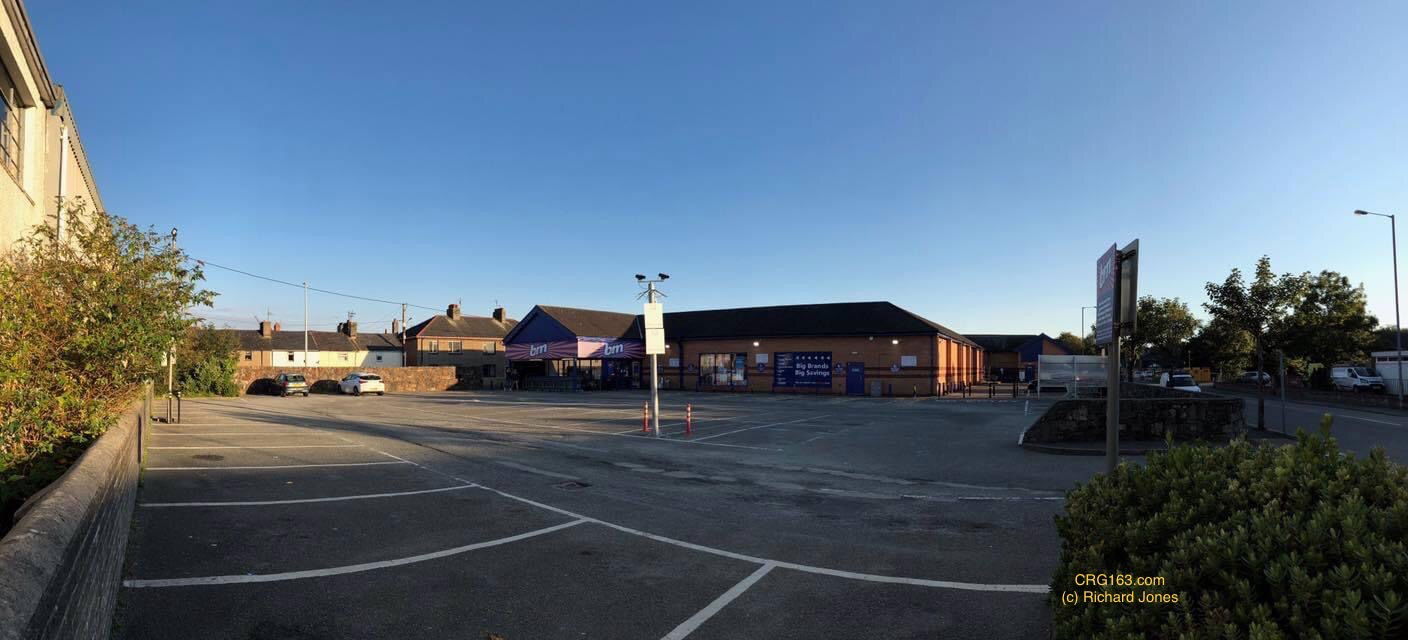 Crosville’s former Pwllheli depot site, presently occupied by a B&M store. Photo: Richard Jones.
Crosville’s former Pwllheli depot site, presently occupied by a B&M store. Photo: Richard Jones.
John Evans had been a long serving and popular Depot Superintendent at West Kirby and therefore a hard act to follow after his retirement. He made me very welcome and did his best to help me settle in, for which I was very grateful. It was, however, a very different proposition to Pwllheli but the two West Kirby T&G reps, Bill Cashman and Bill Casey were very good with me and I learned a lot from both of them. I had gone from a total depot allocation of 16 PVR (Peak Vehicle Requirement) plus seasonal coaches to 39, from one bus out after 1930hrs to many. In fact, when I started in West Kirby, staying in the Dee Hotel in town and stepping outside at 2300hrs, there were more buses and traffic moving about than I often saw all day in Pwllheli during winter.
The depot office staff comprised Chief Clerk/Wages Clerk Don Keedwell with Cash Clerks Molly, Jean and Nora. I had two Garage Foremen, Arthur Holmes and Johnny Knight; two Night Men, Dennis Hockenhull and Bob Evans; Garage Drivers Joe Shakeshaft and Harry Court; all positions unheard of in Pwllheli! While I was at West Kirby, Arthur Holmes retired with Jimmy Bailey being appointed his replacement whilst Pat Gallagher, who had been relief Garage Foreman, was made up to full time foreman. West Kirby depot didn’t have sufficient capacity to house its full allocation of vehicles so an overspill parking area located on Greenbank Road was utilised. The Garage Drivers ferried buses from there to the depot for morning peak and returned them after evening peak. Vehicle allocation ranged from almost new Bristol VRT3’s, Bristol RE, Seddon Pennine RU’s, Leyland Nationals, a Bristol MW coach, an RE coach and an almost new Leopard dual purpose bus/coach.
A lady came to me for a quotation for a coach to take them on a week’s pilgrimage to Walsingham in Norfolk and implored me for a discount that she could report she had negotiated to her committee. Anxious to get the job, I had priced it as keenly as I could but on rechecking my figures, told her the best I could do was to knock £5 off, which she grabbed with both hands. She insisted on giving me a £200 deposit for the job, still six months away, to seal the discount. In those days (1980ish) £200 in a deposit account for six months would have earned her much more than the £5 saved. The job went off very successfully in the capable hands of Ronnie Stringfellow, so much so that the lady returned to book again for the following year, requesting Ronnie once again for their driver.
The winter of 1981/82 was a particularly harsh one with snow on the roads for weeks with freezing temperatures. It showed the dedication of some of the staff when Ronnie Robinson brought his VRT ‘decker in as it was frozen in second gear, saying he would carry on if it could just be frozen in third! When riding to the bank by bus, usually driven by Harry Court or Pat Gallagher, while the snow was on the ground, Harry would deliberately drive through the caked snow at the roadside to try to break it up, to spread it across the carriageway to aid its dispersal with the grit being spread on the roads.
There was, and I believe still is, a very successful canteen and social club situated remotely on Grange Road. It was accessible by foot over the railway bridge behind the depot site about two or three minutes’ walk away. Good reasonably price meals were available all day there and spare drivers would be allowed to go and sit spare over there to get a cuppa when things were quiet, although at busy times, they could be asked to sit spare in the conductor’s room in case they were needed in a hurry. It was rumoured that a breakfast could be had with a Guinness instead of tea but I’m sure that was only for staff who were not on duty.
There are some very pretty and exclusive villages in the area, amongst them the upmarket Caldy Village. There were at times complains from the village as to which vehicles should be allowed to operate through there but I think we all rubbed along pretty well. I do remember a lady who gave her address as Caldy Village coming into the enquiry office and as the office staff had their hands full on cash counting during the mornings, I responded to the enquiry bell. The lady told me “I have come for my umbrella” and after having her describe it, I went to look for it in the Lost Property cupboard but found nothing matching her description exactly. I showed her two similar coloured umbrellas from the cupboard and explained that after she had alighted from the bus, someone may have seen her umbrella and taken it themselves. Her response astounded me as she said “Don’t be so stupid, I was not on a bus, I was on a train”. I suggested to her that she might then like to try the railway station then rather than the bus depot to which she replied “I like that umbrella, can I have that one?” Obviously, she didn’t have it!!
My Divisional Manager was Lionel Wilkinson and Malcolm Karmy his assistant, later replaced by David Jones who had been an NBC Trainee. Their office was in Rock Ferry depot together with divisional schedules office where Bert Duckworth and Steve Williams looked after West Kirby duties and rotas.
A new computer system was to be trialled at Crosville - Traffic Information System – for which a coordinator was being sought. This appealed to me. Individual locations were given an unique code, these being built into light and service journeys, they then built into duty boards, on to rotas. But more of that in the next chapter. For now, I applied successfully for the post and was moving back to work at Crane Wharf leaving West Kirby in the very capable hands of Graham Turner.
That however, is another story, leading to my demise from Crosville, a short coach ownership, 10 years coach driving for Jones Flint, then driving for Chester City Transport and on to conducting and eventually driving trains on the railways.
I never had any direct contact with CRG163 to my knowledge but the foregoing is an outline of my happy times as part of “The Crosville Family”, taken from my memoirs “My Lifetime in Transport” which, although unpublished, I am happy to share Microsoft Word files of with anyone interested.
If you would like a copy, email me at ralph.rowlands4@googlemail.com
11th March 2022.
Ralph Rowlands, Crosville Motor Services, retired